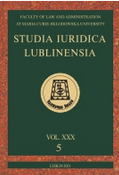On the Rule of Law in Old Poland
On the Rule of Law in Old Poland
Author(s): Jerzy MalecSubject(s): History of Law, Public Administration, Political history, Government/Political systems, 17th Century, 18th Century
Published by: Wydawnictwo Naukowe Uniwersytetu Marii Curie-Sklodowskiej
Keywords: the Polish Republic of Nobles; rule of law; public authorities; statute law;
Summary/Abstract: The Polish Republic of Nobles was characterized by the fact that the activities of public authorities were based on statute law. This is a feature that distinguishes this country from the vast majority of European states in the early modern period where the principle of the sovereign power of the absolute monarch was dominant. In Poland, the highest authority in the state was the Sejm, in which the monarch was only one of the three estates in the Sejm, along with the Senate and the Chamber of Deputies. The General Sejm was formed in the second half of the 15th century, expanding its powers over the next two centuries. At the beginning of the 16th century, the view of the sovereignty of law in the state prevailed among the nobility, to which the monarch himself was also subordinated, according to the principle that in Polonia lex est rex. It can therefore be concluded that in Poland as early as in the 16th century there was a practical division of powers according to the principle that two centuries later would be formulated by Baron de Montesquieu, and which would underlie the constitutional systems of the bourgeois state. The second half of the 18th century brought a further change. It was during this period that the subordination of all activities of the state to the applicable law became even more clear. At that time, an essentially hierarchical structure of executive authorities was established with the king, the Guardians of the Law (Pol. Straż Praw) acting as the government, government commissions constituting central departmental institutions, and commissions of order, which were responsible for the performance of local government. All these collegiate bodies were established by legislation with appropriate Sejm constitutions. Their activity and structure were thus clearly defined by the provisions of law. They could function only within the framework of Sejm statutes and on the basis thereof. In most European countries, it was only the postulates of political liberalism in the 19th century that brought the possibility of extending legislative control over the government in the form of constitutional and parliamentary responsibility of ministers. In Poland, however, this principle was introduced by the Constitution of 3 May 1791.
Journal: Studia Iuridica Lublinensia
- Issue Year: 30/2021
- Issue No: 5
- Page Range: 445-459
- Page Count: 15
- Language: English

